Make a Last Will and Testament
A Last Will and Testament may be a legally binding document that stipulates how a person's assets, including real estate, personal property, and investments, are distributed after the person dies. This document is commonly referred to as a Last Will or Will. After the form is created and signed, in front of two witnesses, the will should be shared with all beneficiaries. It is not required for wills to be filed with the state but certain counties allow this to be done.
Common Questions
Create a Last Will and Testament by State
Create a Last Will and Testament by State
Alternate Names:
A Last Will and Testament is also known as:
-
Will
-
Will and Testament
-
Last Will
What Is a Last Will and Testament?
A last will and testament is a legal document that details how a person's assets and properties will be distributed after their death. This legal document can also specify custody and guardianship details for the surviving children.
To complete your will, you should have a clear idea about what you want to happen to your financial and real estate assets. You should have personal information for the parties that will be receiving these assets in the event of your death. If you have the information you need, you can create a will without a lawyer's assistance.
Do You Need a Will?
The short answer is yes. If you are a legal adult, you need a last will and testament. Dying without a will is known in the legal world as dying "intestate". Essentially, if you have not made your wishes known and legally binding through a will, the state will decide how your property is divided. If you have a spouse or legally recognized partner but no children, then they receive all of your property. If you have children or have no legal partner, the estate's distribution has the potential to become confusing. In extreme instances, everything you own could become the state's property, simply because there was no legally binding will at the time of death.
You aren't required to hire a lawyer to create your will. However, it is best to seek legal counsel regarding the best course of action for planning your estate, given your financial circumstances. If you decide to do this on your own, there are many D.I.Y. books and online resources that can help you to do so (see our last will form above).
A Sample Last Will and Testament with Examples for Each Step
Step 1 - Names of Testator:
In this first section, state your name (the Testator or Testatrix) in the appropriate area. In this case, a Testator is an individual who will be releasing their belongings, possessions, and assets to other individuals once they pass away.
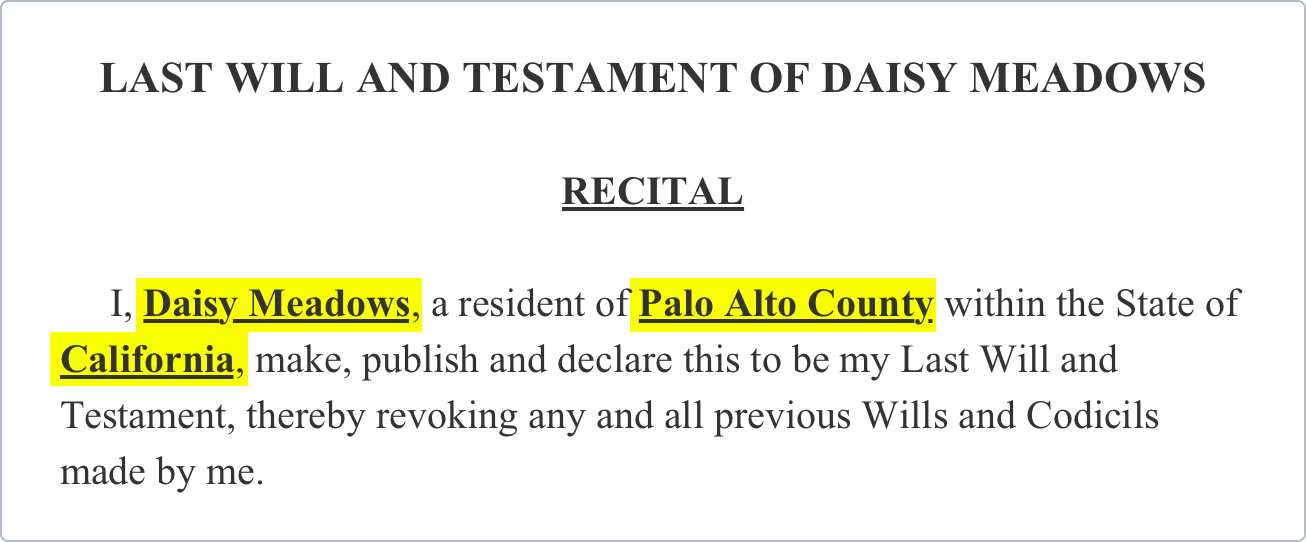
Step 2 - Add Relatives:
In this section, declare your marital status. If you are married, separated, engaged, or widowed, please list the other individual's name.

Step 3 - Add Children:
First, declare how many children you have. For each child, provide his or her name, date of birth, and whether they are living or deceased.
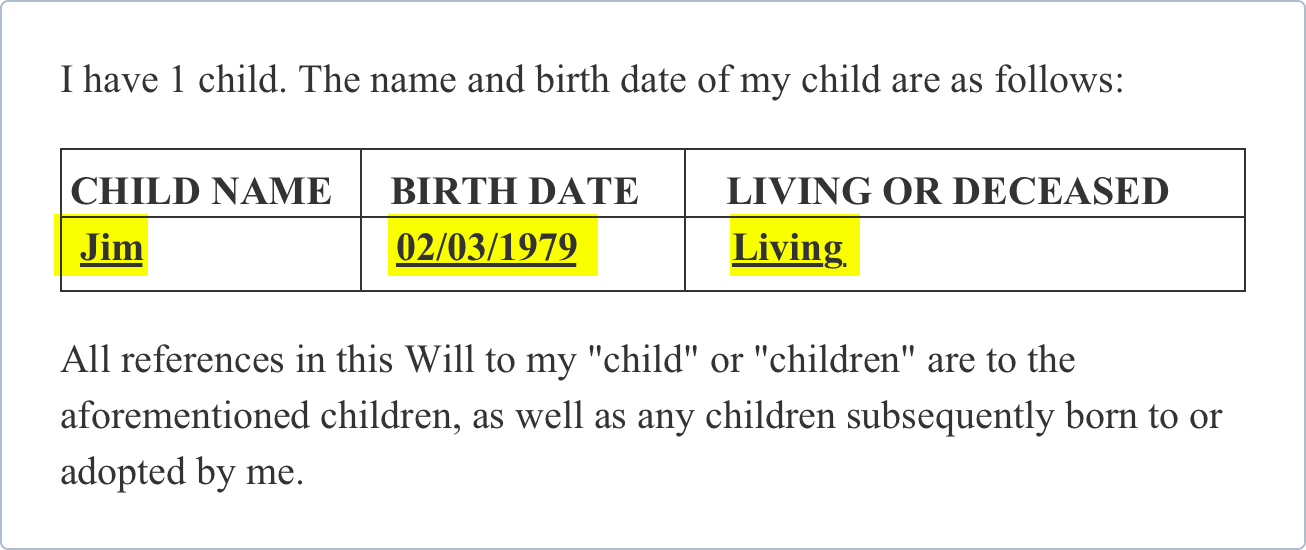
Step 4 - Burial and Funeral Arrangements:
In this step, you will be listing your burial wishes and arrangements. If you know where you would like your funeral home arrangements made, or if arrangements have already been made, provide the following information:
- Funeral Home Name
- Address (including city, state, and zip code)
- Funeral Home Telephone Number
If you will have a repast following your service, provide the following details:
- Location of Repast
- Repast Address (including city, state, and zip code)
If you've made burial arrangements, provide the Cemetery Name and Address.
Also, if you have any memorial wishes, or if you'd like your ashes spread over a body of water or something similar, specify these wishes in this step as well.
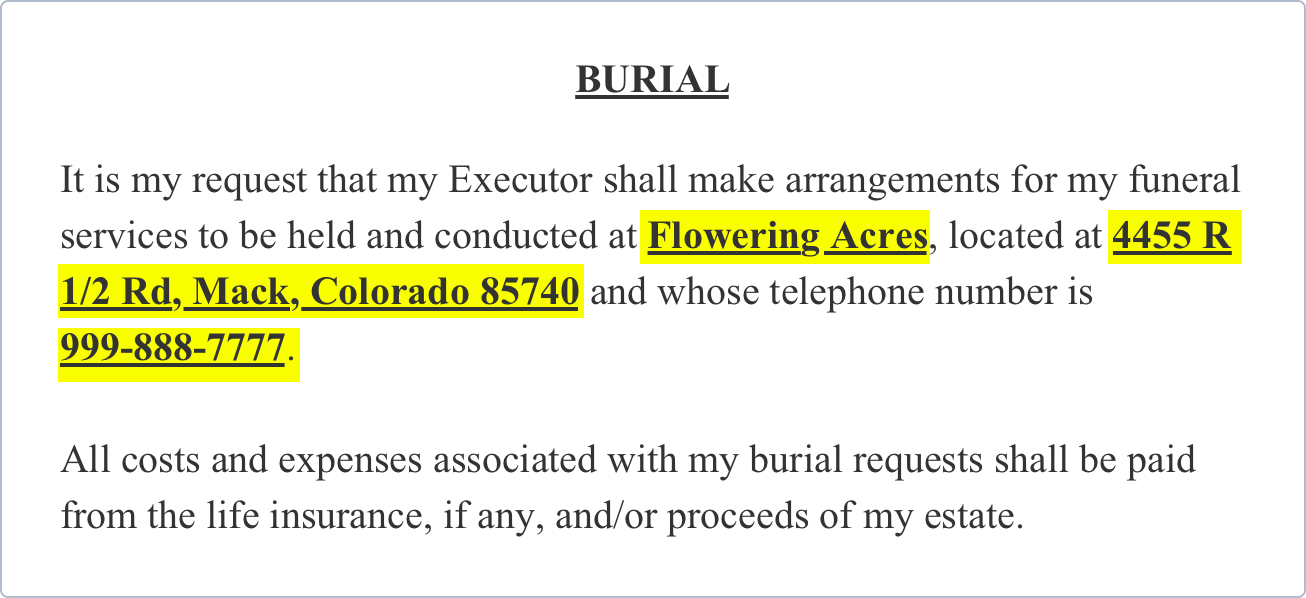
Step 5 - Debts and Expenses:
This section addresses your debts and expenses. In this section, declare the state laws in which taxes, debts, assets, etc., will be subject to.
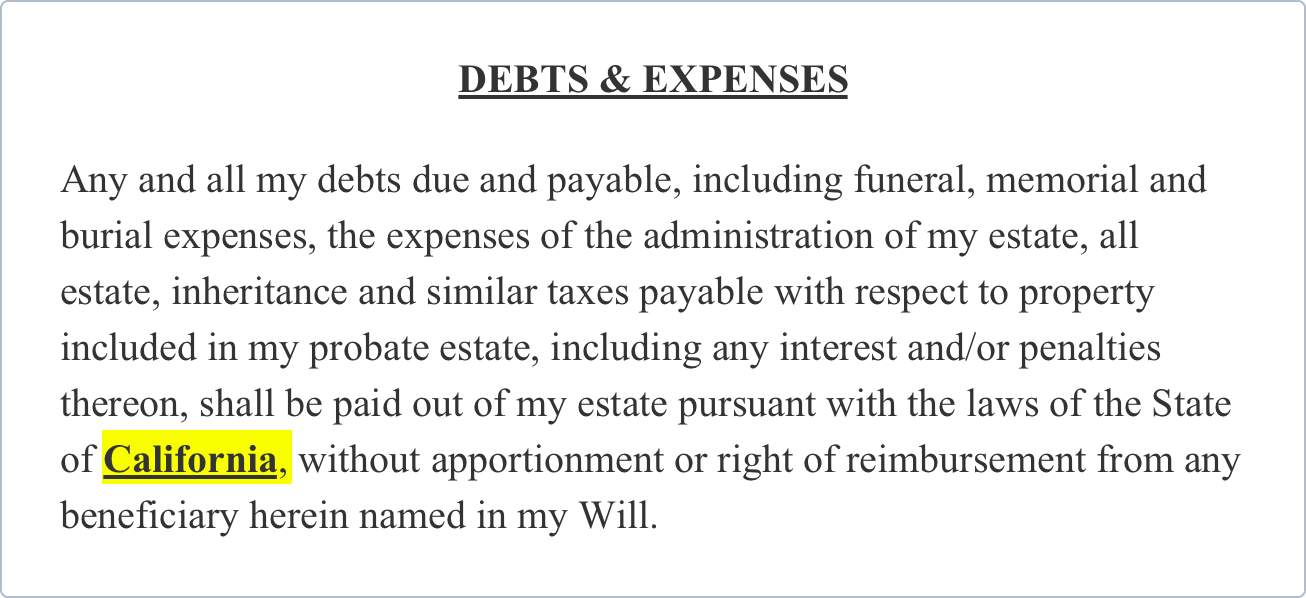
Step 6 - Outline Your Property:
If you own a home or property, specify that here. Provide the address of your home/property
- Address
- City
-
State
-
Zip Code
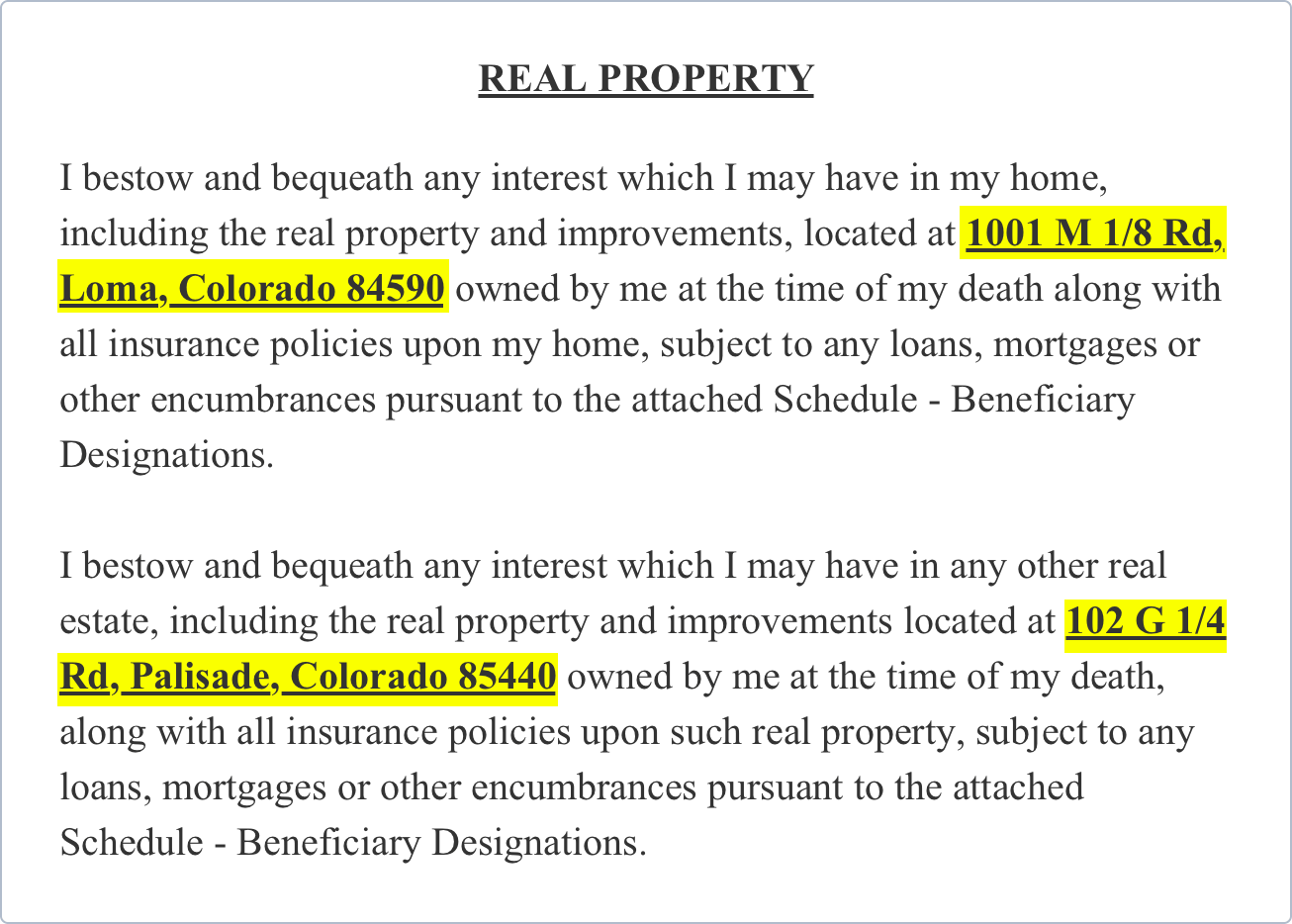
Step 7 - Pet Care:
If you wish for someone to take care of your pets after you pass away, provide the following information of your appointed caretaker or pet organization:
- Name
- Address (including city, state, and zip code)
Also, provide the following information for each pet:
- Pet Type
- Pet Name
- Pet Veterinarian
Step 8 - Appointment Of Executor or Trustee:
This section will allow you to appoint your Trustee or Executor. Do this by providing your Executor/Trustee's name and his or her relationship to you. Be sure to provide an alternative in case your primary Trustee or Executor is unavailable.
Also, if you have Digital Assets, be sure to appoint a Digital Executor. Digital assets are assets like royalties, copyrights, etc. If you have Digital Assets, be sure to list a Digital Executor by providing the following information:
- Name of Digital Executor
- Relationship to you
Besides, provide the same information for an Alternate Digital Executor:
- Name of Individual
- Relationship to you
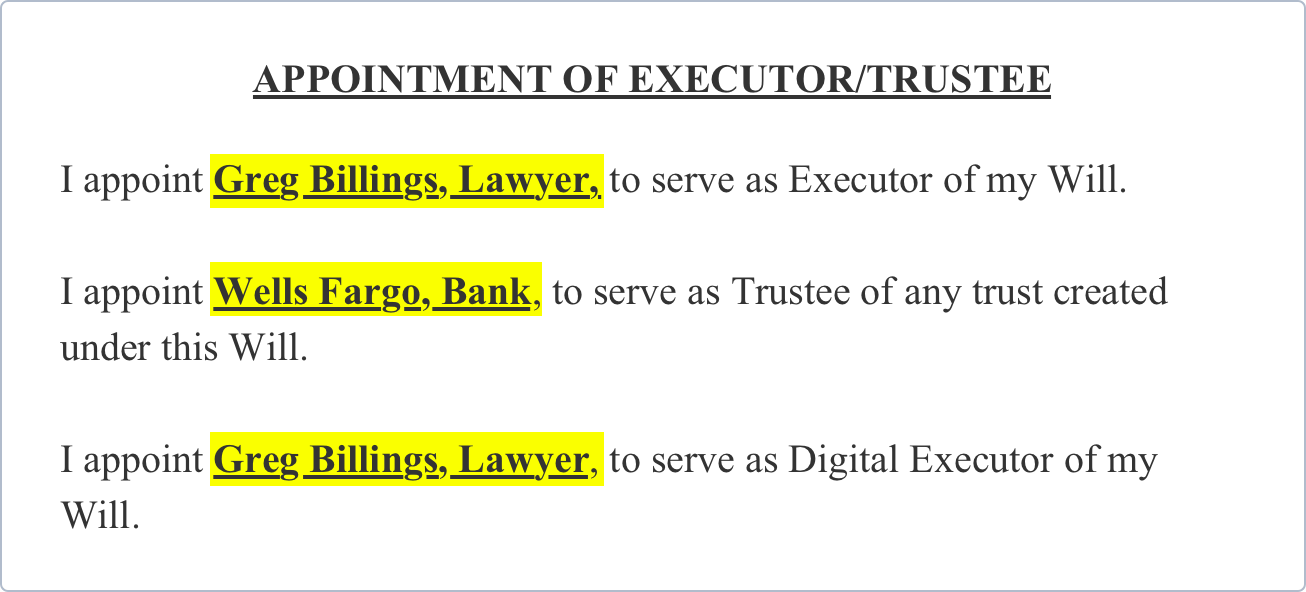
Step 9 - Signatures:
This portion allows the Testator to certify and seal the will, stating that they are of sound mind, and these are their wishes.
First, input your name (the Testator) the appropriate area, and sign, certifying that these are your wishes. Next, provide the following information for each witness:
First Witness' Signature, and;
- Name
- Address (including city, state, and zip code)
- Telephone Number
Second Witness' Signature, and;
- Name
- Address (including city, state, and zip code)
- Telephone Number
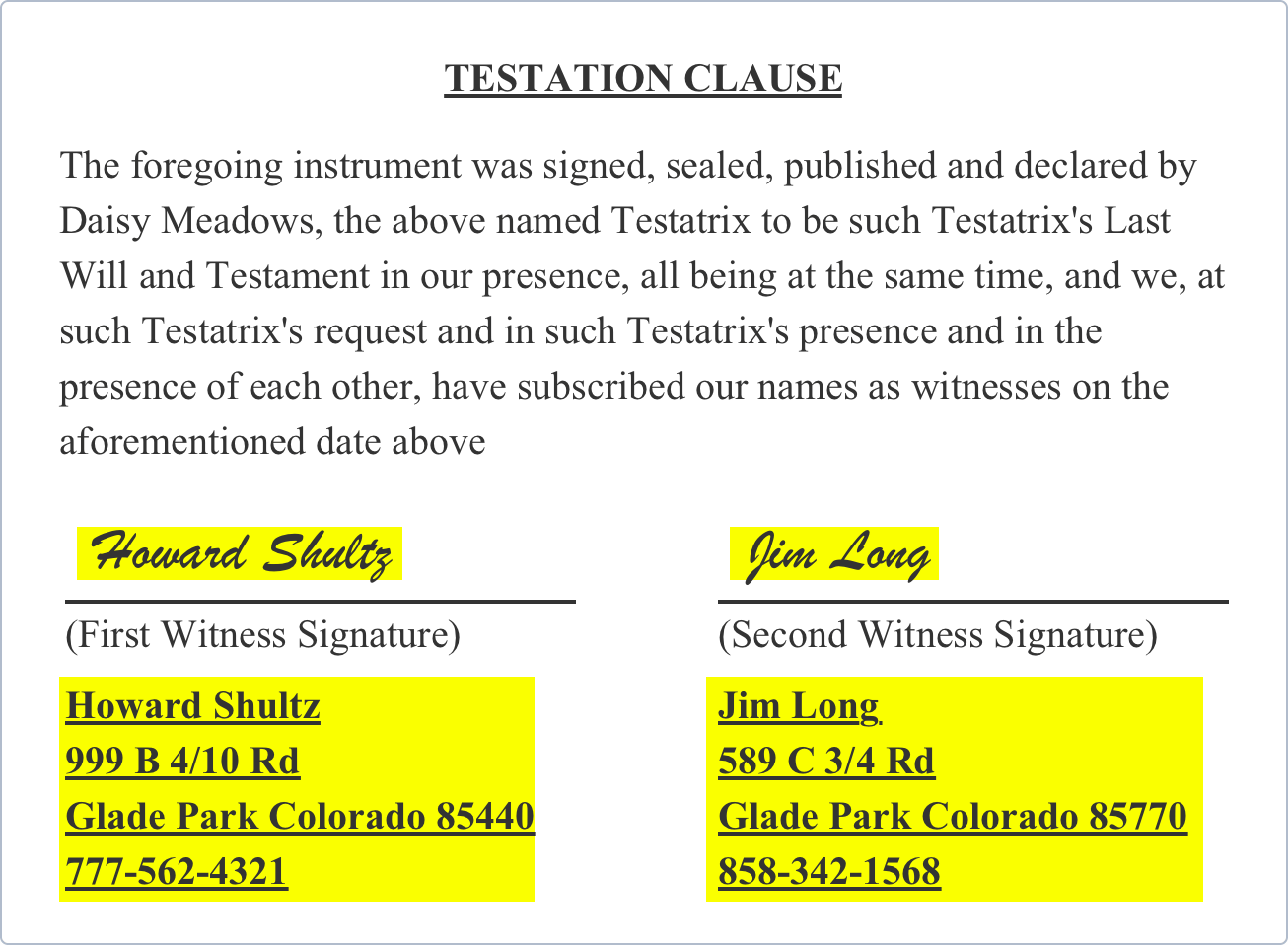
Why is a Last Will Important?
If you don’t have a will, the laws of your state will determine how your property is distributed. This means that your loved ones may not receive the property you wanted them to have.
Here are are some common scenarios about how your assets would be distributed without a will:
-
Single with no children: Your parents receive your entire estate. If one parent is living, that parent will generally receive your entire estate. If no parents are living, the whole estate is divided among siblings. If none of these scenarios apply, other relatives may be able to inherit.
-
Single with children: Generally, the entire estate is equally divided among the children. If there are no living children, the estate goes to grandchildren. If there are no grandchildren, other intestate laws are followed to determine appropriate heirs. If there are no heirs, the state may take possession of the estate.
-
Married with no children: Estate goes to the spouse.
-
Married with children: Estate goes to surviving spouse (assuming children are yours and your spouses). In some states, the spouse receives one half, and the other half is divided among surviving children from different marriages.
-
Unmarried couples: Intestate laws only recognize married couples. Eligible individuals do not usually have a legal claim to their partner's property if they die.
-
Domestic partners: Laws vary widely by state, but generally, a local partner has the same rights as a surviving spouse.
Who can make a Last Will?
Any person of legal age (usually 18 years of age) may make a Last Will, although an exception may be made if you are married, in the military, or have been legally emancipated.
What makes a will invalid?
Most states require that you must be of "sound mind" to make a valid Will which means:
-
You understand you are making a Will and you know what a Will is;
-
You understand your relationship to the people mentioned in your Will; and
-
You understand the types and amount of property you own and how you wish to distribute it
What can I include in my will?
Most of your property can be given away in a will, but there are a few important exceptions:
-
A home owned jointly with your spouse
-
Life insurance
-
IRAs, 401k(s), and pension plans
-
Annuities
-
Any assets in a trust
Important Questions to Consider:
If you have dependents or pets, you should consider what you want your will to specify for their care. You may need to select a guardian that you trust, who should be of legal age, to care for your children and/or pets.
You should consider creating a trust for the benefit of your minor children or pets. The trust should contain detailed instructions on how the funds should be used to care for the benefit of the trustees. If your children or pets need special care or attention, your will and trust should make this unambiguously clear.
How Trusts are Different From Wills:
A trust is essentially a pool of all your assets, including your investments, property, cash, etc. These assets are held in the trust for a beneficiary, usually a child or spouse. You appoint a trustee when you create a trust who will oversee its management. If you create a trust while you are alive, you may act in both the trustee and the beneficiary role. This enables you to determine how you want your assets distributed after you die while still having access to your assets now
Can I leave money to charity?
Absolutely. FormSwift’s will template allows you to specify charities and amounts as part of the step by step process.
What is the difference between a will, a living will, and a power of attorney?
Each of these documents serves an important function, and a good estate plan will include all of them:
- Advanced health care directive or medical power of attorney: This document names who will make decisions about your health if you can't make them yourself.
- Living will: This document explains what sort of medical care, procedures, and treatment you do and do not want to be administered if you become terminally ill and can no longer make your own decisions. Note: In some states, this information is included in the medical power of attorney; in others, it is separate.
- A durable power of attorney: If you are incapacitated and can't manage your finances, this document identifies who will manage your finances on your behalf. It is called "durable" because it allows the named agent to make decisions for you after you've become incompetent. Most powers of attorneys are revoked upon incompetence.
Can I Revise My Will?
You can (and should) revise your will anytime there are major life changes that change your beneficiaries. If you need to make changes to your will, it is prudent to use a codicil form.
Related Documents
Download a PDF or Word Template
Last Will and Testament
A Last Will & Testament is an estate planning document that expresses how you'd like your property dealt with after you die. Even if you don't have any assets, a Last Will & Testament is still an important document. It is also used to name a person to take care of your minor children upon your death. It also cuts down the amount of time it takes for your family or friends to legally manage your affairs.
 Read More
Read More
Medical Power of Attorney
Medical power of attorney names your preferred person to act on your behalf in relation to your future medical decisions. It prepares for the possible eventuality of your becoming unable to express your wishes in regard to your health care, or the possibility of becoming incapacitated through accident or condition.
 Read More
Read More
Guardianship Forms
Guardianship forms apply to an appointed person who has legal rights to make decisions on behalf of another named person, such as a child or vulnerable adult. It may apply to a specific period, or be lasting.
 Read More
Read More

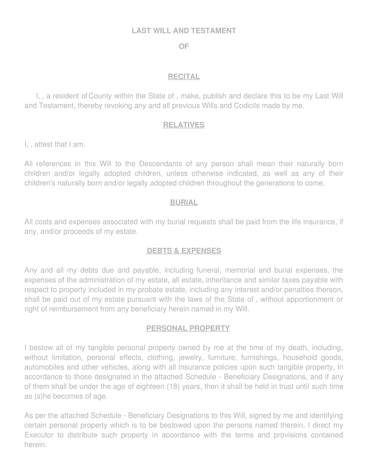
 Download Word Template
Download Word Template
 Download PDF
Download PDF
 Create Custom Last Will and Testament
Create Custom Last Will and Testament

